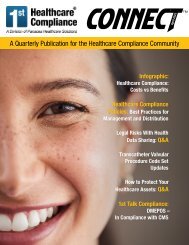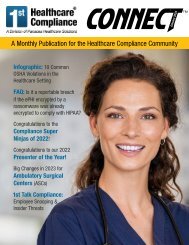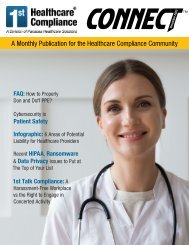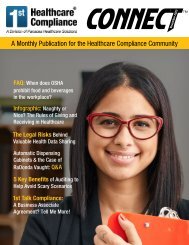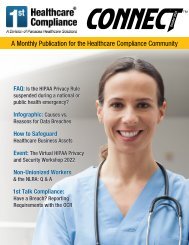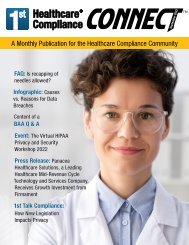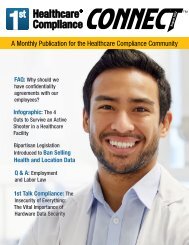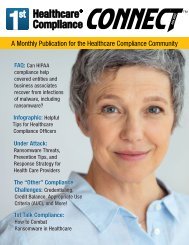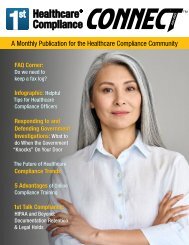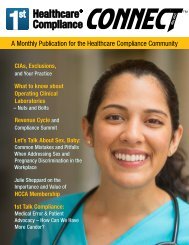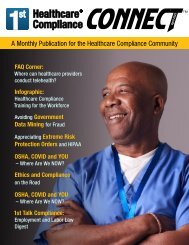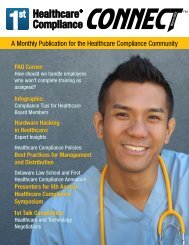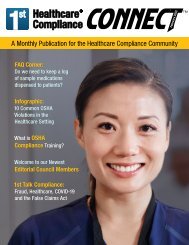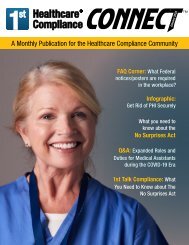First Healthcare Compliance CONNECT August 2020
Create successful ePaper yourself
Turn your PDF publications into a flip-book with our unique Google optimized e-Paper software.
<strong>CONNECT</strong><br />
<strong>August</strong> <strong>2020</strong><br />
A Monthly Publication for the <strong>Healthcare</strong> <strong>Compliance</strong> Community<br />
Combat COVID-19 in the<br />
<strong>Healthcare</strong> Setting with Hand<br />
Hygiene <strong>Compliance</strong><br />
Q&A: COVID 19: Testing,<br />
Reimbursement, and Provider<br />
Relief Funds<br />
3 Important Traits According to<br />
a Corporate <strong>Compliance</strong> Officer<br />
in <strong>Healthcare</strong><br />
1st Talk <strong>Compliance</strong>: The Do’s<br />
and Don’ts of Designing an<br />
Aging Physician Policy<br />
Infographic: 4 Purposes of<br />
Hand Hygiene in the <strong>Healthcare</strong><br />
Setting<br />
FAQ Corner<br />
Upcoming and On-Demand<br />
Webinars
Got a Minute? Please Rate Us!<br />
The health of our company depends on the members<br />
of our community spreading the word about us.<br />
Share Your Success Story<br />
An endorsement by you is the greatest compliment we could receive! Please take a moment<br />
of your time to rate us online so that others can benefit from your experience. It’s a simple<br />
way to help us grow and improve.<br />
We appreciate your support and look forward to hearing from you!<br />
HIPAA PRIVACY<br />
AND SECURITY<br />
SUMMIT <strong>2020</strong><br />
NOVEMBER 12, <strong>2020</strong><br />
In This Issue:<br />
FAQ Corner<br />
Combat COVID-19 in the <strong>Healthcare</strong> Setting with Hand Hygiene <strong>Compliance</strong><br />
Q&A: COVID 19: Testing, Reimbursement, and Provider Relief Funds<br />
2<br />
<strong>First</strong> <strong>Healthcare</strong> <strong>Compliance</strong>, LLC © <strong>2020</strong>
<strong>Compliance</strong> Super Ninja <br />
Laura Troyer, Practice Manager<br />
Jeffrey S. Masin MD<br />
How would you describe your<br />
experience with <strong>First</strong> <strong>Healthcare</strong><br />
<strong>Compliance</strong>?<br />
My experience has been great. The<br />
portal is so easy to use and the weekly<br />
updates are so helpful.<br />
What do you enjoy most about working with Jeffrey S. Masin<br />
MD?<br />
Dr. Masin is so easy to work for. He is so laid back and has been such a<br />
pleasure to work for. When I was diagnosed with cancer he said I<br />
should take all the time I needed and we would be just fine. I am<br />
now cancer free.<br />
Would you rather have x-ray vision or magnified<br />
hearing? Why?<br />
I think I would rather have magnified hearing but would<br />
definitely need to be able to turn it off. It would get annoying!<br />
3 Important Traits According to a Corporate <strong>Compliance</strong> Officer in <strong>Healthcare</strong><br />
Infographic: 4 Purposes of Hand Hygiene in the <strong>Healthcare</strong> Setting<br />
1st Talk <strong>Compliance</strong>: The Do’s and Don’ts of Designing an Aging Physician Policy<br />
Upcoming and On-Demand Webinars<br />
Contact Toll Free: 888-54-FIRST 3
FAQ Corner<br />
Can a hospital provide access to its HIPAA-compliant, web-based<br />
telehealth platform for free to independent physicians on its medical<br />
staff to furnish medically necessary telehealth services during the<br />
time period subject to the COVID-19 Declaration?<br />
According to the facts presented in the question received by the OIG, the hospital would provide free access to a<br />
web-based telehealth platform to independent physicians on its medical staff. Such physicians could access the<br />
platform from various settings outside of the hospital’s campus. The hospital would receive no payment from any<br />
(i) independent physician to whom it grants free access to the platform, or (ii) payor for services furnished through<br />
its telehealth platform by the independent physicians. In addition, independent physicians who use the hospital’s<br />
telehealth platform for free (i) receive no remuneration for use of the platform from the hospital (other than free<br />
access to the platform); (ii) must be responsible for appropriately maintaining any required records for patients<br />
who receive services using the platform; and (iii) independently bill and receive reimbursement from payors for<br />
professional services furnished via the platform.<br />
OIG’s longstanding guidance makes clear that, depending on the facts and circumstances, the provision of free<br />
or below fair market value goods or services to an actual or potential referral source may violate the Federal antikickback<br />
statute. OIG recognizes that access to the platform would provide independent value to the physicians-who<br />
may refer Federal health care program business to the hospital-and therefore would implicate the Federal antikickback<br />
statute. Nonetheless, in the unique and exigent circumstances resulting from the COVID-19 outbreak, we<br />
believe that free access to a hospital’s telehealth platform by physicians on its medical staff would present a low risk<br />
of fraud and abuse under the Federal anti-kickback statute and could improve beneficiaries’ access to telehealth<br />
services, so long as the platform is (i) provided for free to physicians to furnish medically necessary telehealth<br />
services; (ii) provided only when necessary as a result of the COVID-19 outbreak and during the period subject to<br />
the COVID-19 Declaration; (iii) not conditioned on the physician’s past or anticipated volume or value of referrals to,<br />
or other business generated for, the hospital for any items or services that may be reimbursable in whole or in part<br />
by a Federal health care program; and (iv) offered to all physicians on the medical staff on an equal basis (but not<br />
necessarily accepted by every member to whom it is offered).<br />
Provider’s should review the recent guidance published by the Office for Civil Rights titled “Notification of<br />
Enforcement Discretion for Telehealth Remote Communications During the COVID-19 Nationwide Public Health<br />
Emergency.”<br />
Explore more OIG FAQs here.<br />
Explore the FAQs tab in your compliance solution to find<br />
answers to your compliance questions!<br />
CLIENT<br />
ALERT<br />
4<br />
<strong>First</strong> <strong>Healthcare</strong> <strong>Compliance</strong>, LLC © <strong>2020</strong>
4 Purposes of Hand Hygiene<br />
in the <strong>Healthcare</strong> Setting<br />
<strong>Compliance</strong> with hand hygiene is more important than ever. A hand<br />
hygiene program in a healthcare facility is an important step that conveys<br />
competency, professionalism and respect. Proper hand hygiene affords<br />
patients and healthcare providers protections and the<br />
focus is even more important due to COVID-19.<br />
Prevent<br />
nosocomial<br />
infection of<br />
patients<br />
1<br />
2<br />
Prevent<br />
cross-transmission<br />
of microorganisms<br />
between patients<br />
3<br />
4<br />
Prevent<br />
contamination of<br />
the environment<br />
with pathogens<br />
Prevent healthcare<br />
providers from<br />
contracting diseases<br />
in the occupational<br />
setting<br />
Comprehensive <strong>Healthcare</strong> <strong>Compliance</strong><br />
Management Solutions<br />
CONFIDENCE INCLUDED<br />
Creating confidence among compliance<br />
professionals through education,<br />
resources, and support<br />
888.54.FIRST 1sthcc.com<br />
Contact Toll Free: 888-54-FIRST 5
3 Important Traits According to a<br />
Corporate <strong>Compliance</strong> Officer in<br />
<strong>Healthcare</strong><br />
Julie Sheppard, BSN, JD, CHC<br />
Now more than ever, our world is in need of leadership to help<br />
navigate the difficult environment and changing rules and<br />
regulations. <strong>Healthcare</strong> systems and businesses particularly rely<br />
on the skills and attributes of a talented<br />
Chief <strong>Compliance</strong> Officer. The individual<br />
serving in this role is certain to interact<br />
with every employee at some juncture<br />
and impact the overall culture of the<br />
organization. As with all leadership roles,<br />
there are obvious skills and traits that<br />
will help fulfill the position. In addition<br />
to being intelligent and analytical, a<br />
compliance officer must be of high<br />
integrity and possess the ability to<br />
communicate with diverse personalities.<br />
A strong person serves the role of the<br />
compliance officer with confidence and<br />
helps an organization face unavoidable<br />
challenges.<br />
Multiple duties and responsibilities comprise a compliance<br />
officer’s job description making it difficult to determine exactly<br />
the most important skills and traits for a specific organization.<br />
However, there are exemplary professionals serving in the role<br />
of healthcare compliance officer around the United States. One<br />
such individual is Christine Babenko, MJ, MSN, RN, CHC, CCEP,<br />
CHPC, Corporate <strong>Compliance</strong> Officer of ChristianaCare. Ms.<br />
Babenko’s experience in this role is extensive as she has been<br />
with the health system for 23 years and through many changes.<br />
Here, Ms. Babenko shares her insight and expertise on the three<br />
most important traits of a healthcare compliance officer.<br />
What are the three most important traits of a<br />
healthcare compliance officer?<br />
1. Building trust through effective<br />
communication<br />
I don’t want people to think of compliance as<br />
a punishment or a roadblock that they work<br />
to avoid. I want people to feel that they can<br />
come to me and discuss their concern or ask<br />
any questions. I want them to trust that I will<br />
actively listen to learn. I’m on their team and<br />
together, we are stronger!<br />
2. Having a true thirst for knowledge<br />
The regulatory landscape today is very<br />
complex and constantly transforming. Every<br />
<strong>Compliance</strong> Officer must stay abreast of these<br />
relentless changes. In addition, the healthcare<br />
industry is also rapidly changing as providers are tasked with<br />
finding innovative ways to re-imagine health care delivery. The<br />
<strong>Compliance</strong> Officer must have a strong understanding of how<br />
the health system is using innovation to conduct its business.<br />
Integrating innovation into the current and ever-changing<br />
regulatory setting is complicated at best. Intellectual curiosity is<br />
essential!<br />
3. Strong leadership skills<br />
It’s not easy having crucial conversations, delivering bad news,<br />
or reconciling differences. Unfortunately, sometimes it’s part<br />
of the job. <strong>Compliance</strong> Officers must be courageous and lead<br />
6<br />
<strong>First</strong> <strong>Healthcare</strong> <strong>Compliance</strong>, LLC © <strong>2020</strong>
y example. I’m in the final stretch of obtaining my doctorate<br />
degree in Organizational Leadership, Learning and Innovation.<br />
One of my favorite learning moments came from reading<br />
Stephen Covey’s book titled The 7 Habits of Highly Effective<br />
People. Having the ability to critically analyze yourself, and<br />
the insight to know how your behavior impacts others, is an<br />
important leadership skill every <strong>Compliance</strong> Officer needs.<br />
Strong leadership skills will help <strong>Compliance</strong> Officers become<br />
successful change agents for their organization.<br />
The most<br />
comprehensive<br />
healthcare<br />
compliance course<br />
COVID-19 <strong>Healthcare</strong><br />
<strong>Compliance</strong> Updates<br />
The Fundamentals is a user-friendly, four-module<br />
online course designed to help healthcare professionals<br />
understand the essential principles and practices of<br />
compliance.<br />
Written by our “dream team” of healthcare providers and<br />
attorneys, The Fundamentals course is packed with useful,<br />
easy-to-understand information that covers HIPAA, OSHA,<br />
employment law and enforcement of federal healthcare<br />
laws.<br />
The course takes less than four hours to complete, and the<br />
modules can be viewed in any order. A certificate of course<br />
completion is provided following successful completion of<br />
the online course and exam.<br />
In response to the global outbreak of the novel coronavirus<br />
disease (COVID-19), the Secretary of Health and Human<br />
Services declared a public health emergency on January 31,<br />
<strong>2020</strong>. Federal agencies have taken action by issuing updates<br />
and guidance to navigate the crisis. This ebook provides<br />
healthcare providers with important developments and<br />
resources that impact federal healthcare laws.<br />
The <strong>Compliance</strong> Certification Board (CCB)® has approved<br />
this event for up to 4.0 nonlive CCB CEUs. Continuing<br />
Education Units are awarded based on individual<br />
attendance records. Granting of prior approval in no way<br />
constitutes endorsement by CCB of this event content or<br />
of the event sponsor.<br />
Download Now<br />
Buy Course Today<br />
Contact Toll Free: 888-54-FIRST 7
Combat COVID-19 in the<br />
<strong>Healthcare</strong> Setting with Hand<br />
Hygiene <strong>Compliance</strong><br />
Julie Sheppard, BSN, JD, CHC<br />
The importance of hand hygiene compliance has never<br />
been greater as it’s a vital part of the U.S. response to the<br />
COVID-19 pandemic. All individuals are instructed to wear<br />
a mask, practice social distancing and exercise frequent<br />
hand washing. In medical offices and hospitals hand hygiene<br />
takes on even greater significance. Practicing hand hygiene,<br />
which includes the use of alcohol-based hand rub (ABHR) or<br />
handwashing, is a simple yet effective way to prevent the<br />
spread of pathogens and infections in healthcare settings.<br />
Hand hygiene is especially important in the<br />
healthcare environment<br />
On any given day, about one in 31 hospital patients has at<br />
least one healthcare-associated infection. Nosocomial or<br />
hospital acquired infections may be difficult to treat and<br />
are often life threatening. <strong>Compliance</strong> with hand hygiene<br />
is one of the most important ways to prevent spread of<br />
infection. Transmission of pathogens can potentially occur<br />
at many points of contact with the healthcare provider and<br />
hand washing mechanically removes pathogens while ABHR<br />
properly used as recommended by CDC inactivates SARS-<br />
CoV-2. ABHR effectively reduces the number of pathogens<br />
that may be present on the hands of healthcare providers<br />
after brief interactions with patients or the care environment.<br />
The need for hand hygiene applies to all healthcare personnel<br />
(HCP). HCP refers to all paid and unpaid persons serving<br />
in healthcare settings who have the potential for direct or<br />
indirect exposure to patients or infectious materials, including<br />
body substances (e.g., blood, tissue, and specific body fluids);<br />
contaminated medical supplies, devices, and equipment;<br />
contaminated environmental surfaces; or contaminated<br />
air. HCP include, but are not limited to, emergency medical<br />
service personnel, nurses, nursing assistants, physicians,<br />
technicians, therapists, phlebotomists, pharmacists,<br />
students and trainees, contractual staff not employed by<br />
the healthcare facility, and persons not directly involved in<br />
patient care, but who could be exposed to infectious agents<br />
that can be transmitted in the healthcare setting (e.g., clerical,<br />
dietary, environmental services, laundry, security, engineering<br />
and facilities management, administrative, billing, and<br />
volunteer personnel).<br />
How often should HCPs wash their hands?<br />
According to the CDC, studies show that some healthcare<br />
providers practice hand hygiene less than half of the times<br />
they should. <strong>Healthcare</strong> providers might need to clean their<br />
hands as many as 100 times per 12-hour shift, depending on<br />
the number of patients and intensity of care. In fact, multiple<br />
opportunities for hand hygiene may occur during a single<br />
care episode.<br />
HCP should perform hand hygiene before and after all patient<br />
contact, contact with potentially infectious material, and<br />
before putting on and after removing PPE, including gloves.<br />
Hand hygiene after removing PPE is particularly important to<br />
remove any pathogens that might have been transferred to<br />
bare hands during the removal process.<br />
8<br />
<strong>First</strong> <strong>Healthcare</strong> <strong>Compliance</strong>, LLC © <strong>2020</strong>
What are the hand hygiene guidelines?<br />
CDC recommends using ABHR with greater than 60%<br />
ethanol or 70% isopropanol in healthcare settings. Unless<br />
hands are visibly soiled, an alcohol-based hand rub is<br />
preferred over soap and water in most clinical situations<br />
due to evidence of better compliance compared to soap and<br />
water. Hand rubs are generally less irritating to hands and<br />
are effective in the absence of a sink.<br />
Hands should be washed with soap and water for at least<br />
20 seconds when visibly soiled, before eating, and after<br />
using the restroom. Wash with soap and water:<br />
• Immediately before touching a patient<br />
• When hands are visibly soiled<br />
• Before performing an aseptic task (e.g., placing<br />
an indwelling device) or handling invasive medical<br />
devices<br />
• After caring for a person with known or suspected<br />
infectious diarrhea<br />
• Before moving from work on a soiled body site to a<br />
clean body site on the same patient<br />
• After known or suspected exposure to spores (e.g.<br />
B. anthracis, C difficile outbreaks)<br />
• After touching a patient or the patient’s immediate<br />
environment<br />
• After contact with blood, body fluids or<br />
contaminated surfaces<br />
• Immediately after glove removal<br />
Resources for hand hygiene compliance<br />
Hand hygiene supplies must be readily available and<br />
healthcare facilities must educate patients, visitors, and<br />
HCP about the importance of performing hand hygiene<br />
immediately before and after any contact with their<br />
facemask or cloth face covering. Employees should be<br />
trained about hand hygiene necessity and their role in<br />
reducing preventable infections.<br />
Many high quality resources are available to learn more<br />
about hand hygiene in healthcare settings. There’s an<br />
informational video available from the New England Journal<br />
of Medicine. The World Health Organization provides a<br />
hand hygiene self-assessment framework. <strong>First</strong> <strong>Healthcare</strong><br />
<strong>Compliance</strong> offers a poster set that addresses hand<br />
washing along with Personal Protective Equipment (PPE)<br />
and infection control.<br />
Navigating Workplace Violence<br />
Prevention Under OSHA<br />
Workplace violence is a serious issue, especially in healthcare facilities. In 2013<br />
alone, over 25,000 occupational assault injuries occurred, most of which were<br />
in the health care and social services industries. The Occupational Safety and<br />
Health Administration (OSHA) responded in 2015 by updating and publishing<br />
their guidelines on how to best prevent workplace violence. The OSHA workplace<br />
violence prevention guidelines help employees and employers alike by providing<br />
the necessary steps to maintain a safe work environment.<br />
DOWNLOAD NOW<br />
Contact Toll Free: 888-54-FIRST 9
Q&A: COVID 19: Testing,<br />
Reimbursement, and Provider<br />
Relief Funds<br />
By Catherine Short<br />
Emily A. Johnson and Courtney Tito, Members, at<br />
McDonald Hopkins LLC recently presented the<br />
webinar “COVID 19: Testing, Reimbursement,<br />
and Provider Relief Funds” and the recording<br />
is available on our YouTube Channel. Emily and<br />
Courtney returned to answer many commonly<br />
asked questions from the webinar.<br />
What is the difference between diagnostic and<br />
antibody testing?<br />
Diagnostic testing identifies people who are currently infected,<br />
whereas antibody (otherwise known as serology) testing looks<br />
for antibodies to the virus, which can help identify individuals<br />
who have developed an adaptive immune response to the<br />
virus as part of either an active infection or a prior infection.<br />
Antibody test results are important for detecting previous<br />
infections in individuals who had few or no symptoms.<br />
How reliable is antibody testing?<br />
The utility of antibody test results is unknown as scientists<br />
are still exploring the possibility of COVID-19 reinfection.<br />
Specifically, it remains uncertain whether the antibodies that<br />
result from a COVID-19 infection will provide someone with<br />
immunity from getting infected again. If antibodies do provide<br />
immunity, it is unknown how long the immunity will last.<br />
However, the information yielded from the antibody testing<br />
can potentially be used to determine the percentage of a<br />
geographic area previously infected with COVID-19 in order<br />
to determine which communities have higher rates of herd<br />
immunity.<br />
What documentation should an employer<br />
have with labs and employees to commence<br />
return to work COVID testing?<br />
An employer should have a laboratory services agreement with<br />
the performing laboratory that identifies the services to be<br />
provided by the laboratory and the method of compensation for<br />
such services. Additionally, employee consent forms should be<br />
used so that the employee understands how the test results<br />
may be used by an employer. Also, the laboratory should<br />
require the employee to sign an authorization permitting<br />
the laboratory to release the employee’s test results to the<br />
employer, particularly if the laboratory is subject to HIPAA.<br />
Other issues that may come up in these arrangements include<br />
permitting requirements if specimen collection will occur on<br />
the employer’s premises, identifying who will be supplying<br />
protective face masks to the employee who presents for<br />
specimen collection (the employer, the lab, or the employee),<br />
among other issues.<br />
How often should return to work testing be<br />
performed?<br />
For most employers, there is no set framework and the<br />
employer should establish a frequency that works best for<br />
the particular workplace. This should be documented in the<br />
employer’s policies and procedures. For healthcare employers<br />
10<br />
<strong>First</strong> <strong>Healthcare</strong> <strong>Compliance</strong>, LLC © <strong>2020</strong>
such as nursing homes, hospitals, and assisted living facilities,<br />
there may be a state-issued executive order defining the<br />
testing that is required to be performed on employees of such<br />
entities and the frequency that such testing must be performed.<br />
It is important to regularly monitor the applicable state’s<br />
communications and orders on this issue.<br />
Emily A. Johnson is a Member at McDonald Hopkins LLC,<br />
Chicago and practices in its Health Law group. Ms. Johnson<br />
counsels and represents clients in the healthcare industry,<br />
with an emphasis on laboratories and pathology groups.<br />
Ms. Johnson provides advice on wide range of healthcare<br />
regulatory issues, including but not limited to Stark Law, Anti-<br />
Kickback Statute, licensure, reimbursement and contractual<br />
matters. Ms. Johnson has also counseled clients with<br />
HIPAA compliance, including<br />
drafting HIPAA policies and<br />
procedures, breach response and<br />
notification, Office for Civil Rights<br />
investigations, and advising on<br />
proactive HIPAA compliance and<br />
breach prevention. She has also<br />
advised clients regarding direct to<br />
consumer testing issues.<br />
Ms. Tito is a Member of McDonald Hopkins, LLC and practices<br />
in its Health Law group in the West Palm Beach office. Ms.<br />
Tito counsels and represents clients in the health law industry,<br />
including, federal and private payor audits and disputes,<br />
reimbursement, contract, corporate, enrollment revocations,<br />
payment suspensions, internal investigations, compliance and<br />
regulatory, and in responding to federal subpoenas and civil<br />
investigative demands. She advises clients in both federal and<br />
state matters. She has counseled<br />
clients on regulatory, licensing,<br />
compliance, reimbursement,<br />
corporate, CLIA standards, state<br />
and federal fraud and abuse rules<br />
and regulations and telehealth<br />
matters. She has also advised clients<br />
regarding direct to consumer issues.<br />
Check out a recording of this webinar and others by Emily<br />
A. Johnson, Courtney Tito, and Elizabeth Sullivan, Members<br />
at McDonald Hopkins, LLC with <strong>First</strong> <strong>Healthcare</strong> <strong>Compliance</strong>:<br />
Payor Disputes And Audits Observations Strategies, and<br />
Eliminating Kickbacks in Recovery Act (EKRA): Summary and<br />
Status, and listen to Courtney and Catherine on our radio<br />
program and podcast 1st Talk <strong>Compliance</strong>. Take a look at our<br />
new book: HIPAA Privacy and Security; our recent blog articles<br />
including Q&A: Payor Disputes and Audits: Observations &<br />
Strategies and CMS Updates <strong>Compliance</strong> Program Training<br />
Requirements for FDRs and our online compliance training<br />
courses such as The UPIC is Coming: CMS Auditors 2.0, and<br />
MACRA – Medicare Access & Chip Reauthorization Act of 2015.<br />
HIPAA Privacy and Security<br />
<strong>First</strong> <strong>Healthcare</strong> <strong>Compliance</strong> HIPAA Privacy and Security is a user-friendly<br />
resource designed to help healthcare, administrative, and compliance<br />
professionals, whether they serve as a covered entity or a business associate,<br />
better understand their compliance responsibilities under the Health Insurance<br />
Portability and Accountability Act. The book explains HIPAA privacy, security,<br />
enforcement and breach notification in plain language, and provides a<br />
comprehensive checklist that entities can use to get their compliance efforts<br />
off the ground.<br />
BUY BOOK NOW<br />
Contact Toll Free: 888-54-FIRST 11
hosted by Catherine Short<br />
Catherine Short speaks with Dr. Mary Hoppa, MD, MBA, senior consultant with The Greeley Company<br />
which provides solutions through consulting, education, interim staffing, credentialing management,<br />
and external peer review to healthcare organizations nationwide, about “The Do’s and Don’ts of<br />
Designing an Aging Physician Policy.” We will discuss how to identify and address competency issues<br />
among senior physicians and best practices to prevent potential safety incidents that could have longterm<br />
consequences for both patients and practitioner. We will also learn how to recognize age related<br />
impairments that affect a healthcare professional’s ability to safely administer care, look at how to design<br />
a fair aging policy to protect both practitioners and patients, as well as focusing in on how to address<br />
competency issues and when privileging needs to be reassessed or revoked.<br />
Listen weekdays at<br />
7:30am, 3:30pm, 11:30pm ET<br />
Check out our Show Page!<br />
Looking for the latest compliance insights?<br />
Subscribe to our feed and don’t miss a thing!<br />
12<br />
<strong>First</strong> <strong>Healthcare</strong> <strong>Compliance</strong>, LLC © <strong>2020</strong>
WORD SEARCH<br />
A N P O G Q G R Z D H D R D V D J E F I<br />
T E D Y C T N E M P I U Q E A A A H E M<br />
Y R E G U L A T I O N U Z O C N X C O D<br />
I A M L R I W W S Z F O P K T Q N Y E I<br />
N C X S U T K C G M M Y M I N A W D B A<br />
A H V C T N E M E S R U B M I E R L B G<br />
D T P I M I W P W K O O K L H O I A X N<br />
C L R E J P A X Y I D C P Y Y P D I Z O<br />
K A A N M M Y S R Y C M W F G M L M H S<br />
T E R T A W L E E A O M P J I G I O G T<br />
J H Z I N E E C H C Z D K C E S U C I I<br />
G L V S A A A R T T E O U I N D C O V C<br />
Z G Q T G G D U Z W S R L F E Q E S S L<br />
W N F S E D E O T H A U B P B Y X O O F<br />
T Z W L M M R S Y N F R V L M A E N B W<br />
D J O W E O S E I R Z K H A Z S R P L X<br />
V N E C N O H R J Y Y S C E I C C Q G N<br />
R W K L T O I I J F V A T B U K I G O G<br />
V Y Y Z W E P V G Z W M V Y Q H S B I U<br />
R B K H I F I E Y F N X W V Q J E A W K<br />
HYGIENE MASK EXERCISE<br />
HEALTHCARE NOSOCOMIAL MANAGEMENT<br />
COMPLIANCE EQUIPMENT ANTIBODY<br />
DIAGNOSTIC SCIENTISTS REIMBURSEMENT<br />
REGULATION LEADERSHIP RESOURCES<br />
Contact Toll Free: 888-54-FIRST 13
Upcoming and On-Demand Webinars<br />
Training<br />
AUG 18, <strong>2020</strong><br />
SEPT 9, <strong>2020</strong><br />
SEPT 22, <strong>2020</strong><br />
OCT 6, <strong>2020</strong><br />
ON DEMAND<br />
ON DEMAND<br />
Diagnosis Coding: The Cost of One and Done<br />
Federal <strong>Healthcare</strong> Fraud and Abuse Framework<br />
How Workplace Communication Mitigates<br />
Harassment<br />
Why are Security & Governance for Health Data<br />
Analytics Vital?<br />
COVID 19: Testing, Reimbursement, and Provider<br />
Relief Funds<br />
Active Shooter in a <strong>Healthcare</strong> Facility-Planning for<br />
Responding to & Recovering from the Unthinkable<br />
Register<br />
Register<br />
Register<br />
Register<br />
All Upcoming Webinars<br />
All On Demand Webinars<br />
NEW FEATURES!<br />
Training Zone - New required training modules have been added titled “Fraud<br />
Waste and Abuse Training” and “General <strong>Compliance</strong> Training”. These modules replace the<br />
CMS training materials.<br />
Employee Zone - A Notes button has been added to the HepB Vaccination Status section.<br />
OSHA Zone - To assist with successfully completing your assessment embedded links to<br />
Resources have been added.<br />
New COVID-19 Resource section available from the dashboard for 1st Performance, 1st<br />
Professional, and 1st Premium.<br />
CLIENT<br />
ALERT<br />
Join us on Social Media!<br />
Contact our Client Services Team with your questions!<br />
888.54.FIRST or clientservices@1sthcc.com<br />
14<br />
<strong>First</strong> <strong>Healthcare</strong> <strong>Compliance</strong>, LLC © <strong>2020</strong>




